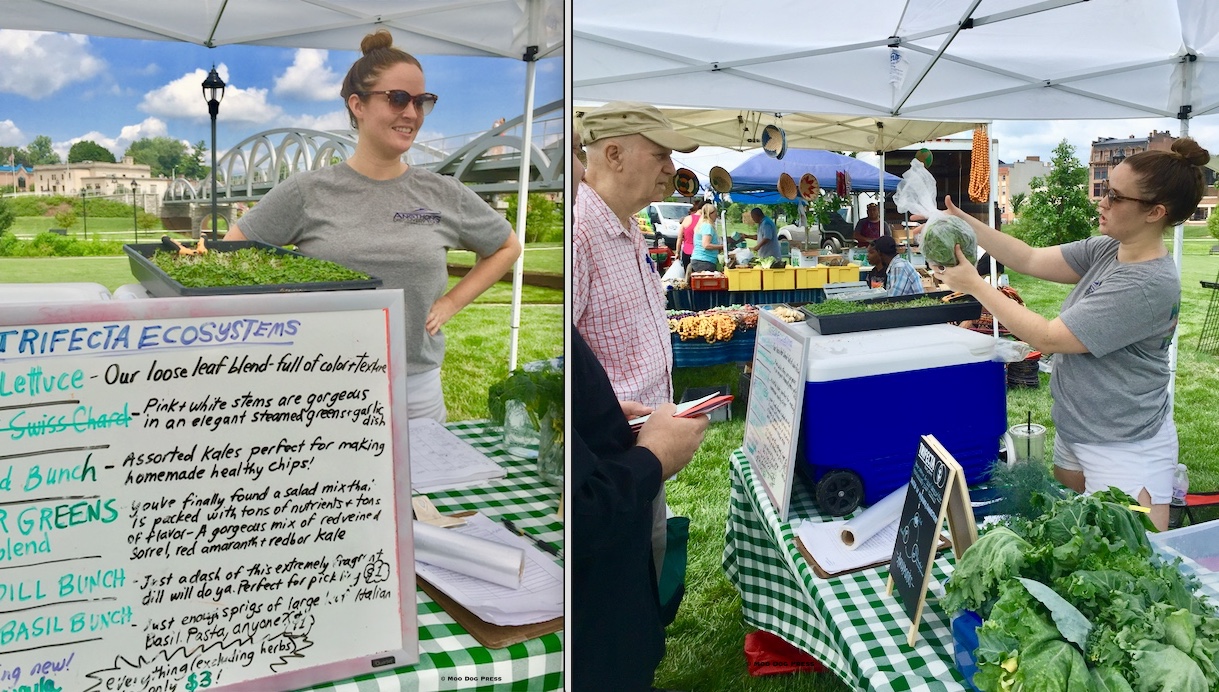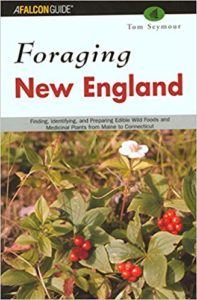Food Connects All: Farmers’ Markets, Ideas, Communities, Entrepreneurs
Pay attention. (Good advice for writers and entrepreneurs.)
Growing food and bringing goods to market is an entrepreneurial business. Stories behind a market vendor's offerings can be surprising.
By the way, it’s National Farmers Market Week – Aug. 5 to Aug. 11. Great community resources from micro-enterprises to well-established small businesses, artisans, makers, farms of every size plus startup ventures growing well, creating access to fresh foods – and some surprising finds.
Trifecta Ecosystems at the Meriden Farmers Market (Saturdays) – where market goers can pick from microgreens, dill, mixed greens, kale, chard, arugula, and more. But this is a hydroponics farm – growing crops inside at 290 Pratt St. The business recently received a $500,000 initial investment from the South Central Regional Water Authority (RWA) to “help expand its farming and education operations.” But there is more. The RWA will invest up to $2 million in Trifecta Ecosystems (contingent on meeting goals in the process). The RWA is a non-profit public corporation created by the Connecticut Legislature in 1977. RWA owns more than 27,000 acres of land and provides a wide array of recreational opportunities and water-related services. Through the Whitney Water Center, hands-on water science programs are offered to thousands of students annually. “On average, we supply 45 million gallons of water a day to a population of some 430,000 persons. We provide water and other services in all or portions of Ansonia, Bethany, Branford, Cheshire, Derby, East Haven, Hamden, Milford, New Haven, North Branford, North Haven, Orange, Seymour, West Haven and Woodbridge. We own land in Beacon Falls, Guilford, Killingworth, Madison, and Prospect.” – from the RWA “About” page.

Two views of the Meriden Farmers market and Trifecta Ecosystems – a variety of fresh greens grown minutes away.
In September, Putting Up Shoots, a national-in-scope business-hydroponics conference – is coming to Hartford. Part of the event will be tours of businesses – including Trifecta's indoor farm operations in Meriden.
The 2018 Aquaponics Association Conference will be held in Hilton Hartford Hotel in Connecticut on Friday, Sept. 21 through Sunday, Sep. 23, 2018. “This exciting three-day conference will feature some of the most innovative and experienced educators, researchers, builders and commercial farms from around the world.” For information about the event, STEM education, etc., contact community@aquaponicsassociation.org.
A related new venture and hydroponics enterprise that you may have missed. In Feb. 2018, Governor Dannel P. Malloy announced Four Season Farm LLC, a newly-formed venture created by a long-time Connecticut farmer, international greenhouse developer, and former Wall Street executive, will develop 10 acres of land in Suffield as a hydroponic farm, where the company plans to create 40 new jobs over the next two years.
“Farming in the 21st century can be very different from what we know, and Four Season Farm can lead the way with this innovative, technologically advanced operation,” Governor Malloy said. “We’re happy to have them establish their operations in our state and look forward to seeing them grow.”
Hydroponic farming is an eco-friendly process, whereby water is recycled, soil is undisturbed, CO2 is consumed, and renewable approaches are used in cultivation.
The partners in the venture are Joe Geremia, who runs 7 acres of greenhouses in Wallingford, Henry Froese, a pioneer and expert in the building of greenhouse operations, and Herbert Soroca, CEO of North Cove Capital Advisors in Stamford, which provides financial, management and strategic advice to emerging-growth companies. Four Season Farm has a five-year plan that includes a 10-acre facility that is projected to produce 5.75 million pounds of tomatoes the first year and 7.5 million pounds by the third year. Eventually, the farm plans to create a 43-acre greenhouse complex and add crops such as cucumbers, peppers and micro greens. DECD is providing $3 million in financing support for the purchase of machinery and equipment for the farm business.
A book – or a library – in whatever form that takes – connects a mind to the resources of accumulated knowledge, experiences, gleaned from living and observing. Books, e-books, audio books, yes. But also arboretums are botanical information. Museums hold objects and artifacts that hold cultural history, waiting for interpretation, new light. Archives at institutions in every sector from law to newspapers, companies to personal ephemera – rich veins of stored data. So, too, are people whose interviews yield stories that won't be told unless a writer finds them and pulls disparate threads together.
Editor. A word that means to choose. Much like a chef chooses ingredients. Or a grower sizes up what to plant and how much. So many factors come into play.
Words wielded do matter. Use judgment, decide what goes and what stays. Prune and nip, sometimes cut back severely for new growth. Deadhead the old; bring forth new, revised or slumbering stories. All of the living and doing, traveling and people met, worked with and for – bears upon the now and illuminating understanding, the asking of questions. There is always more to know. Always something to learn about by asking and listening. Stories can be a crop of information that can cross pollinate to grow new resources and connections. Or inspire someone to start that business, reach for their dream. Or read about a business with integrity and find a way to apprentice and learn, follow in their footsteps – to make the world better, not less.
Farmers' markets are weekly or twice-weekly or daily gatherings of local food, business, music, entertainment. Ideas can be found at each – for those who look closely. Weather is always a factor; market masters much like school superintendents must keep an eye on the sky and make a call – market, yes? (Or no?)

People making a difference. Stephanie Jarm, Doug Sacks, co-market managers, with Linda Wood Neilson, staff and cookbook author of Wethersfield Farmers Market – the plaque Doug is holding is for “valuable and significant contributions to the town of Wethersfield's economic development” presented by Wethersfield Economic Development and Improvement Commission. Photo courtesy WFM.
Observe. Connect. Remember.
For instance, when spinach wouldn't flourish and Swiss chard struggled, a verdant crop of “weeds” sure did grow gangbusters.
While doing mid-afternoon proofing, my eye fell upon a title in the closest bookshelf – “Foraging New England” by Tom Seymour A Falcon Guide, an imprint of The Globe Pequot Press (GPP), Guilford, Connecticut. (Disclosure: The 5th edition of “Sort Nature Walks in Connecticut Short Nature Walks, published in 1999, is a book done for GPP as revision author – walking around the state to add and subtract entries, and update information. The original “60 Selected Nature Walks in Connecticut” guide was created by the late Eugene Keyarts: here's a link to a New York Times story about him in 1985 – he was 85 at the time, when the shoreline town of Madison was his home. A columnist and a conservationist, Keyarts was a founding member of the Madison Land Trust – among other accomplishments.)
The subtitle of that book about foraging? Finding, Identifying, and Preparing Edible Wild Foods and Medicinal Plants from Maine To Connecticut. Inside, glossy photographs of those “weeds” growing amid the squash and tomatoes, beans and potatoes, dill – all being cultivated steps away from my kitchen. As a believer in feeding the soil and using no pesticides paired up with a passion for growing plants for decades (a greenhouse built of reclaimed windows and filled with plants and experiments at age 16) – know that it is important to “listen” to what wanted to grow – and using all that green in meals makes sense. (The book does include caveats for identifying species and knowing the land upon which it grows – if treated with poisons or there is exposure to contaminants, do not consume anything.) Green amaranth. Lamb's quarters. Purslane. All delicious added to stir fry, or nibbled raw (after washing off, of course.) There are chapters on edibles sectioned by habitat – seashore, shade, cultivated ground, steams, trees, woodlands, more.
And then found this (a tweet via Twitter that prompted more reading):
“Our work with invasive species and weeds is no longer novel but the approach is still new to many others. We can only hope that the work we do be a beacon of light for others trying to do the right thing too. The utilization of invasive species and weeds aims the human appetite, the most destructive force on Earth, at species that are environmentally destructive.
“There are many reasons to eat invasive species and weeds. Wild plants and animals are healthier to eat than farmed. Wild plants, such as edible weeds, are exponentially more nutritious than cultivated species.”
Bun Lai
October 2017 of Miya's – “The First Sustainable Sushi Restaurant on Earth” – and a 2016 White House Champions of Change Honoree, New Haven, CT.
Timing.
“Long before I wrote stories, I listened for stories. Listening for them is something more acute than listening to them.” – Eudora Welty

